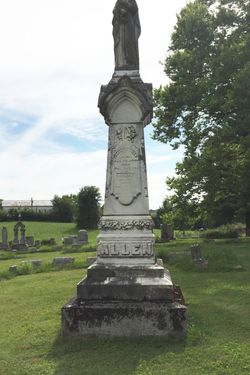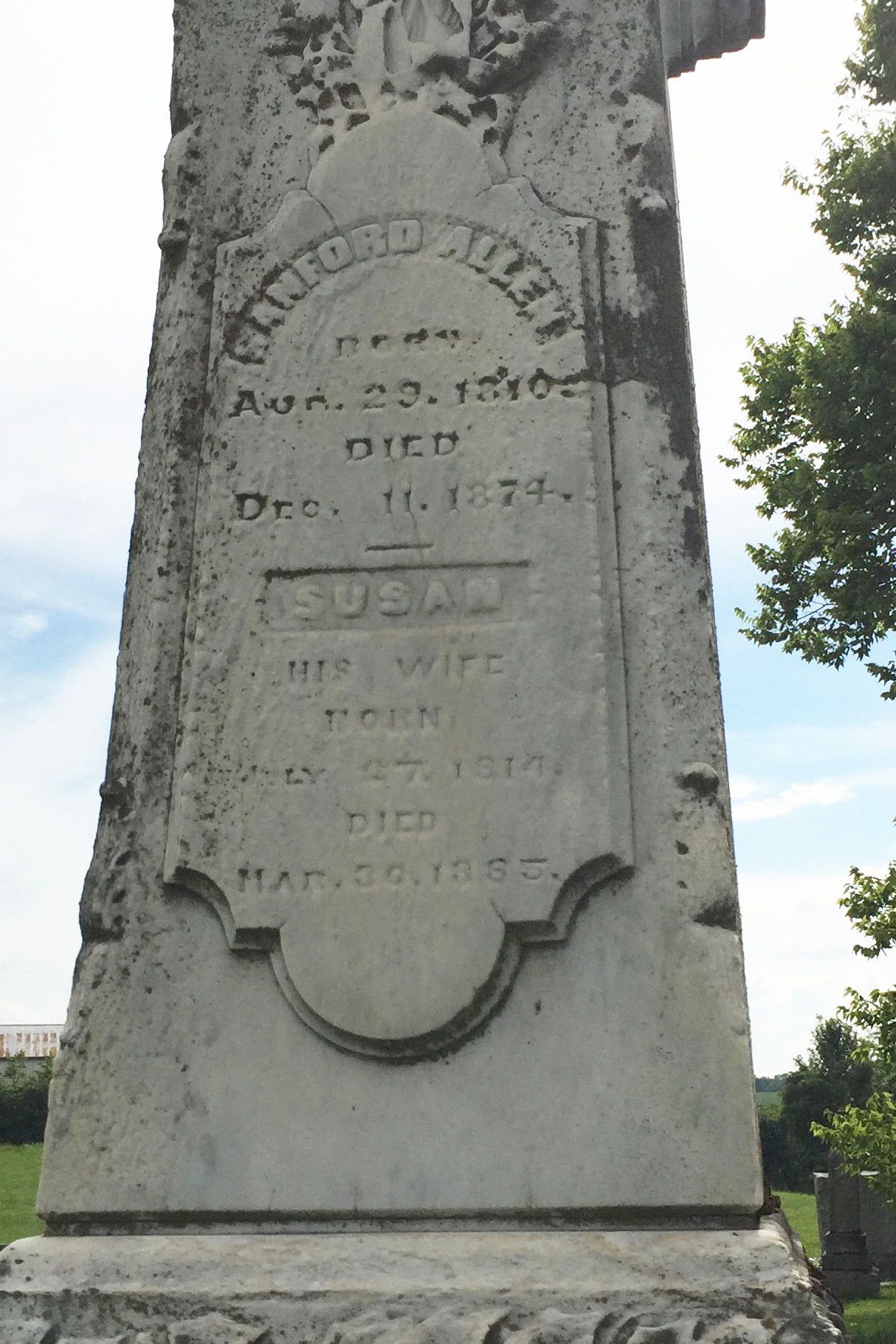Maj. John Allen (1749-1815)
Jane Tandy (1765-1849)
Parents:
Granville Allen (11/15/1786-2/1/1844 Bourbon, KY)
Jane Vivian Sanford (1790-1858)
Wife:
Susannah Smith Shumate (1814-1885)
Children:
1.Granville Allen (1834-____)
2. Peyton Shumate Allen (1835-1836)
3. William Wallace Allen (1839-1841)
4. Julian Grosjeans Allen (1843-____)
5. John Walter Allen (1847-1928)
6. Frank Sterling Allen (1850-1927)
7. Charles Peters Allen (1851-1920)
8. Henry Tureman ( Maj Gen) Allen (1859-1930)
9. Thomas Jones Allen (1860-1929)
10. Sanford Allen (1866-1916)
About his son:
From the description of Papers of Henry T. Allen, 1806-1933
Henry Tureman Allen (1859-1930), U.S. Army officer, was born at Sharpsburg, Kentucky, the thirteenth child and ninth son of Ruben Sanford and Susannah Shumate Allen.
The immigrant ancestor on his father's side went to Virginia in 1636; his mother descended from a Huguenot settler in Virginia whose name, de la Soumatte, was transformed to Shumate.
Allen spent one year in Georgetown College, Kentucky, before entering West Point in 1878. Upon his graduation in 1882 he was commissioned second lieutenant in a cavalry regiment and was promoted in due course until he reached his colonelcy in 1916.
He served in the Pacific Northwest until placed in charge of an Alaskan exploring expedition in 1885, the first of many unusual assignments which made his career notable. Covering twenty-five hundred miles in the course of a year's work, the expedition examined a large area hitherto unexplored and produced serviceable maps of the Copper, Tanana, and Koyukuk rivers.
Service at western posts and at West Point during the next few years was broken by tours as military attaché in Russia from 1890 to 1895 and in Germany from 1897 to 1898.
Recalled from Germany at the outbreak of the war with Spain, he went through the Santiago campaign, being cited for gallantry in action at El Caney. He contracted yellow fever in Cuba and was invalided home.
On his recovery he went again to Germany as military attaché but was soon brought back for assignment to one of the volunteer regiments organized to suppress the insurrection in the Philippines, in which he was appointed major. Upon the termination of hostilities the government resolved upon the formation of a Philippine constabulary, military in organization and training, but an instrument of the civil power. Allen was charged with its creation and remained its chief until 1907 when he returned to duty in the United States.
In 1916 he commanded his regiment during the pursuit of Villa in northern Mexico. He was appointed brigadier-general in the regular army, May 15, 1917, and temporary major-general, August 5, 1917.
After organizing and training the 90th Division, he took it abroad, and on August 19, 1918, went into the battle line west of the Moselle. From then until the armistice the division was at the front, taking part in the St.-Mihiel and Meuse-Argonne offensives.
In July 1919 Allen assumed command of the American forces in Germany and entered upon the most difficult of all his tasks, perhaps the most brilliantly executed of them all. He had to maintain discipline in an army quartered inactively on foreign soil; he had to control a defeated population; he had to restrain his French associates without incurring their permanent enmity. Difficult as the situation was, it was rendered seemingly impossible when the inter-allied commission attempted to take charge under the terms of the treaty of Versailles while the American commander was bound by his orders to retain control of the zone assigned to him following the armistice.
Allen returned home early in 1923, to the regret of all parties in the zone of occupation. Speaking for the French, M. Tirard of the High Commission said, "We have been impressed by his high-mindedness and the perfect impartiality of his judgment" (Rhineland Occupation, p. 335). Prince Hatzfeldt declared that "we had arrived as enemies and were leaving as friends--a rare occurrence in history" (Journal, p. 571). It seems simple truth to say that by no human possibility could the task have been better done than was done by Allen.
His military career was ended. He had been appointed major-general in the regular army in 1920 and now retired from active service, Apr. 23, 1923, but retained an interest in civic and charitable affairs. He was a strong advocate of the League of Nations and the Kellogg peace pact.
From the description of Allen, Henry T. (Henry Tureman), 1859-1930 (U.S. National Archives and Records Administration).
Biographical Note
1859, Apr. 13: Born, Sharpsburg, Ky.
1882: Graduated, United States Military Academy, West Point, N.Y.
1887: Married Dora Johnston
1885 - 1886 : Engaged in exploration of Alaska
1888 - 1890 : Instructor, United States Military Academy, West Point, N.Y.
1890 - 1895 : Military attaché, Russia
1897 - 1898 : Military attaché, Germany In Santiago Campaign as major and adjutant general In Philippines as lieutenant colonel, Forty-Third Regiment
1901: Governor, Island of Leyte Started organization of Philippine Constabulary; was its chief
1903: Brigadier general and chief of constabulary by act of Congress
1910 - 1912 : Lieutenant colonel, General Staff, in charge of Cavalry Section, War Department
1916 - 1917 : In Mexican Punitive Expedition as lieutenant colonel and colonel
1917: Organized cavalry brigade from Thirteenth Cavalry Regiment, Fort Riley, Kans. Assigned as commander, Ninetieth Division, Camp Travis, Tex.
1917 - 1918 : Commanded Ninetieth Division at Toul, Saint-Mihiel, Meuse-Argonne, France
1918 - 1919 : Commanded Eighth Army Corps at Montigny-sur-Aube, France
1919: Commanded Ninth Army Corps at Nogent-en-Bassigny, France Commanded Seventh Army Corps at Wittlich, Germany
1919 - 1923 : Commanded American forces in Germany
1923: Retired from United States Army
1928: Active in organizing veterans' groups for Alfred Emanuel Smith for president; unsuccessful aspirant for Democratic vice-presidential nomination
1930, Aug. 30: Died, Burne Vista Spring, Pa.
Maj. John Allen (1749-1815)
Jane Tandy (1765-1849)
Parents:
Granville Allen (11/15/1786-2/1/1844 Bourbon, KY)
Jane Vivian Sanford (1790-1858)
Wife:
Susannah Smith Shumate (1814-1885)
Children:
1.Granville Allen (1834-____)
2. Peyton Shumate Allen (1835-1836)
3. William Wallace Allen (1839-1841)
4. Julian Grosjeans Allen (1843-____)
5. John Walter Allen (1847-1928)
6. Frank Sterling Allen (1850-1927)
7. Charles Peters Allen (1851-1920)
8. Henry Tureman ( Maj Gen) Allen (1859-1930)
9. Thomas Jones Allen (1860-1929)
10. Sanford Allen (1866-1916)
About his son:
From the description of Papers of Henry T. Allen, 1806-1933
Henry Tureman Allen (1859-1930), U.S. Army officer, was born at Sharpsburg, Kentucky, the thirteenth child and ninth son of Ruben Sanford and Susannah Shumate Allen.
The immigrant ancestor on his father's side went to Virginia in 1636; his mother descended from a Huguenot settler in Virginia whose name, de la Soumatte, was transformed to Shumate.
Allen spent one year in Georgetown College, Kentucky, before entering West Point in 1878. Upon his graduation in 1882 he was commissioned second lieutenant in a cavalry regiment and was promoted in due course until he reached his colonelcy in 1916.
He served in the Pacific Northwest until placed in charge of an Alaskan exploring expedition in 1885, the first of many unusual assignments which made his career notable. Covering twenty-five hundred miles in the course of a year's work, the expedition examined a large area hitherto unexplored and produced serviceable maps of the Copper, Tanana, and Koyukuk rivers.
Service at western posts and at West Point during the next few years was broken by tours as military attaché in Russia from 1890 to 1895 and in Germany from 1897 to 1898.
Recalled from Germany at the outbreak of the war with Spain, he went through the Santiago campaign, being cited for gallantry in action at El Caney. He contracted yellow fever in Cuba and was invalided home.
On his recovery he went again to Germany as military attaché but was soon brought back for assignment to one of the volunteer regiments organized to suppress the insurrection in the Philippines, in which he was appointed major. Upon the termination of hostilities the government resolved upon the formation of a Philippine constabulary, military in organization and training, but an instrument of the civil power. Allen was charged with its creation and remained its chief until 1907 when he returned to duty in the United States.
In 1916 he commanded his regiment during the pursuit of Villa in northern Mexico. He was appointed brigadier-general in the regular army, May 15, 1917, and temporary major-general, August 5, 1917.
After organizing and training the 90th Division, he took it abroad, and on August 19, 1918, went into the battle line west of the Moselle. From then until the armistice the division was at the front, taking part in the St.-Mihiel and Meuse-Argonne offensives.
In July 1919 Allen assumed command of the American forces in Germany and entered upon the most difficult of all his tasks, perhaps the most brilliantly executed of them all. He had to maintain discipline in an army quartered inactively on foreign soil; he had to control a defeated population; he had to restrain his French associates without incurring their permanent enmity. Difficult as the situation was, it was rendered seemingly impossible when the inter-allied commission attempted to take charge under the terms of the treaty of Versailles while the American commander was bound by his orders to retain control of the zone assigned to him following the armistice.
Allen returned home early in 1923, to the regret of all parties in the zone of occupation. Speaking for the French, M. Tirard of the High Commission said, "We have been impressed by his high-mindedness and the perfect impartiality of his judgment" (Rhineland Occupation, p. 335). Prince Hatzfeldt declared that "we had arrived as enemies and were leaving as friends--a rare occurrence in history" (Journal, p. 571). It seems simple truth to say that by no human possibility could the task have been better done than was done by Allen.
His military career was ended. He had been appointed major-general in the regular army in 1920 and now retired from active service, Apr. 23, 1923, but retained an interest in civic and charitable affairs. He was a strong advocate of the League of Nations and the Kellogg peace pact.
From the description of Allen, Henry T. (Henry Tureman), 1859-1930 (U.S. National Archives and Records Administration).
Biographical Note
1859, Apr. 13: Born, Sharpsburg, Ky.
1882: Graduated, United States Military Academy, West Point, N.Y.
1887: Married Dora Johnston
1885 - 1886 : Engaged in exploration of Alaska
1888 - 1890 : Instructor, United States Military Academy, West Point, N.Y.
1890 - 1895 : Military attaché, Russia
1897 - 1898 : Military attaché, Germany In Santiago Campaign as major and adjutant general In Philippines as lieutenant colonel, Forty-Third Regiment
1901: Governor, Island of Leyte Started organization of Philippine Constabulary; was its chief
1903: Brigadier general and chief of constabulary by act of Congress
1910 - 1912 : Lieutenant colonel, General Staff, in charge of Cavalry Section, War Department
1916 - 1917 : In Mexican Punitive Expedition as lieutenant colonel and colonel
1917: Organized cavalry brigade from Thirteenth Cavalry Regiment, Fort Riley, Kans. Assigned as commander, Ninetieth Division, Camp Travis, Tex.
1917 - 1918 : Commanded Ninetieth Division at Toul, Saint-Mihiel, Meuse-Argonne, France
1918 - 1919 : Commanded Eighth Army Corps at Montigny-sur-Aube, France
1919: Commanded Ninth Army Corps at Nogent-en-Bassigny, France Commanded Seventh Army Corps at Wittlich, Germany
1919 - 1923 : Commanded American forces in Germany
1923: Retired from United States Army
1928: Active in organizing veterans' groups for Alfred Emanuel Smith for president; unsuccessful aspirant for Democratic vice-presidential nomination
1930, Aug. 30: Died, Burne Vista Spring, Pa.
Gravesite Details
Thought to be buried here with family.
Family Members
-
![]()
Granville Allen
1834–1854
-
![]()
Peyton S. Allen
1835–1836
-
![]()
William Wallace Allen
1839–1841
-
![]()
Laura L. Allen
1840–1855
-
![]()
Isabelle Virginia "Jennie" Allen Cracraft
1841–1926
-
![]()
Julian Grosjean Allen
1843–1917
-
![]()
John Waller Allen
1847–1928
-
![]()
Frank Sterling Allen
1850–1927
-
![]()
Charles Peters Allen
1851–1909
-
![]()
Henry Tureman Allen
1859–1930
-
![]()
Thomas Jones Allen
1860–1929
Advertisement
Advertisement





















